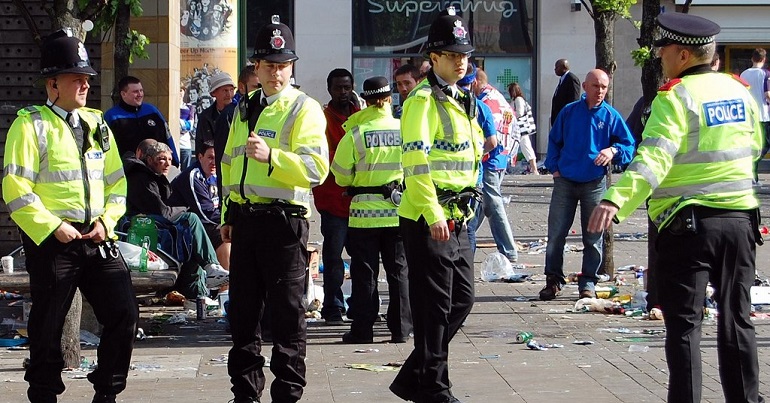A year in prison for throwing a stick?
A twenty year old student from York, Francis Fernie, has been jailed for a year for throwing a stick at the police on 26 March. Specifically, he was found guilty of violent disorder.
A year seemed to me to be an extraordinarily long time to me for such an offence. But these are the sorts of things most of us don’t really have a handle on – what is normal for this type of crime? Let’s imagine that he had done the exact same thing, but not done it at a demo.
Well, throwing a stick at someone is basically common assault – certainly I think most people would think it is. If we look at the Crown Prosecution Service guidance on punishments for this crime, the maximum sentence is 6 months. This is the maximum. The guidance is clear that there are various factors that show how severe it is – the main one being the level of injury. I haven’t seen any evidence that anyone was injured by this crime.
Similarly, it would be normal for a reduction of sentence in this case because the defendent peaded guilty. The fact that he handed himself in may also reduce his sentence, we might think? So a defendent who commited a common assault, did not injure anyone, then handed themselves in and pleaded guilty – what would they get? Certainly much less than the maximum of 6 months.
Or should we take into account the fact that it’s assault on a police officer? The law does usually make that sort of distinction. In fact, they have seperate guidance for this sort of thing – see “Assault on Constable in the execution of his/her duty, contrary to section 89(1) Police Act 1996” which says:
“24) The fact that the victim is a police officer is not, in itself, an exceptional reason for charging an offence contrary to section 47 when the injuries are minor”
So that isn’t relevant. And the maximum for this is 6 months too anyway.
Looking at the guidance into violent disorder – the crime for which he was charged – it appears that the fact that he was a part of a crowd is the relevant factor.
Now, I’m not an expert, but that seems bizarre. Essentially, for a crime for which under normal circumstances he would have got a maximum sentence of 6 months – and probably much less – he is has been sentenced with a full year in jail simply because he was in a crowd. Is that really a rational way to apply the law?
Or is the judge giving him a harsher sentence because the large crowd he was in was a demonstration – because it was political?
According to the York Press:
‘the judge said the right to peaceful demonstration was a “hallmark” of this country’s democracy, but added: “The courts have a duty not only to punish those who inflict violence or acts of fear on the public or inflict violence on the police, but also to deter others from behaving in such a way.’
Why should this detterence apply to crimes comitted by people at demos but not to other violent crimes?




Douglas – I never said this was peaceful. Clearly it isn’t. I never said it wasn’t a crime – clearly it was.
Yes, intent is obviously an important factor, but there is no *more* intent here than there would be if the charge had been common assault. My point was to compare this crime whith something similar but in a different context. As I say above, I can see to an extent why doing something whilst in a crowd does make this sort of crime slightly more dangerous. But I don’t see why this makes it many times more dangerous than throwing a stick at a police officer when there isn’t a crowd. I’m not saying that the law was necessarily mis-applied. My point is that a law which draws such a huge distinction between a violent act commited by someone standing on their own, and someone acting as part of a crowd, is an odd one which I don’t think is just.
Whatever the law says, I think we have to recognise that violence is often a necessary part of social change. The government will use violence against any successful civil disobedience or strikes, the police will deliver this violence, and we will need to defend ourselves. While March26th was the wrong time for that, there will be a lot more violence if the anti-cuts movement gains strength. Think of the miners defending their strikes, the police violently breaking up picket lines, the battle of Orgreave etc. or even a politically excluded greek village opposing a landfill development http://www.guardian.co.uk/environment/2011/apr/19/keratea-greece-protests-landfill-salles
Its a shame when a young person is jailed, probably for no more than getting totally caught up in the emotions of the event.
It doesnt matter whether or not someone is injured though. Intent is an important aspect as well. He wasnt throwing the stick for a dog to fetch an accidentally hit someone. He was throwing the stick in the direction of the police whilst at a demonstration that was not peaceful. As I keep telling you (and keep getting called a troll for doing so) there are many people out there who find even your definitions of peaceful protest distressing.
I think Daniel makes the key point about when, where and why he pleaded guilty to that particular offence.
I also think you need to look at your victim complex as the fact that the demo was ‘political’ has nothing to do with the punishment given. And, if you have any experience of listening to sentences, many sheriffs and judge use that deterrence line (clearly it doesn’t work so in general we need a different sentencing structure in this country anyway – more rehabilitation please).
Thanks for the comments.
Maybe I haven’t made it clear in the above – I am not saying that the judge hasn’t applied the law appropriately – s/he is clearly more of an expert than me. My point is that the law seems to be an odd one. I can see the risk of aggrevating a crowd, sure. But does that really justify what would effectively be a doubling of the maximum normal sentence? As I say, given the reductions we might expect in normal circumstances for pleading guilty, and because no one seems to have been injured, surely what must be much more than a doubling is excessive for this one factor.
My point is not that the law has been misapplied. My point is that the law seems wrong to me.
Adam
I don’t know this case particularly, but a few comments :
– I don’t think a 12 month sentence for chucking things at policemen is particularly harsh, whatever the guidelines.
– All the stuff about common assault isn’t relevant – he’s been charged (and pleaded guilty to) violent disorder – you don’t say what the guidance is in terms of sentencing is. Whether you think it’s fair or not, he pleaded guilty and presumably had advice from a solicitor and knew the likely range of sentences. I don’t know if it’s relatively harsh or not.
– You say that this deterrence applies only to people at demos – I strongly suspect that most people charged with this have been involved in football crowd violence. The size of the crowd does make a significant difference to the offence.
– in a not entirely dissimilar case, a friend of mine in my youth threw a beer glass randomly at a crowd in a disturbance outside a nightclub. It hit someone and cut them, though not badly. He was arrested and eventually charged with malicious wounding. He pleaded guilty and received three years imprisonment – and served all three. Although none of us expected that he’d be treated leniently (glasses are not nice things to chuck around) the severity of his sentence – to a first time offender – was a shock to him and many others – the judge in sentencing, told him (I’m paraphrasing) – If you’re wondering why your sentence is so severe, it’s because in the hierarchy of violent crimes, there is murder, attempted murder, and then the crime which you have committed.
Looking back some thirty odd years later, I’m inclined to side with the judge – but didn’t then.
While I make no comment on this particular case, knowing very few details apart from the above, it does make sense to me that violence committed as part of a crowd perhaps ought to face more severe penalties, given the greater possibility of escalation that such actions can provoke. Of course, this cuts both ways: police brutality ought also to face even sterner sanction in such situations.
If he pleaded guilty to a charge of “Violent Disorder” then he will be sentenced as if that were the crime he had committed, whether or not he did, in fact, commit that offence and whether or not it can be proven beyond reasonable doubt.
1) never the believe the nice friendly police officer however reasonable s/he seems to be
2) always get a solicitor to explain the law to both you and the nice friendly police officer
3) only plead guilty to things you have actually done, that is, only when the legal definition of the charge exactly describes the circumstances and the evidence and there is absolutely no other possible interpretation of those circumstances and evidence
Maximum sentence for violent disorder is 5 years.
It attracts a heavier sentence than common assault etc because it was designed to legislate against semi-organised, crowd type violence, and you must be acting together with at least 2 others to commit the offence.
As his sentence is less than 18 months, he will be released on licence a quarter of the way through i.e. after 3 months. He’ll be out by the start of October.